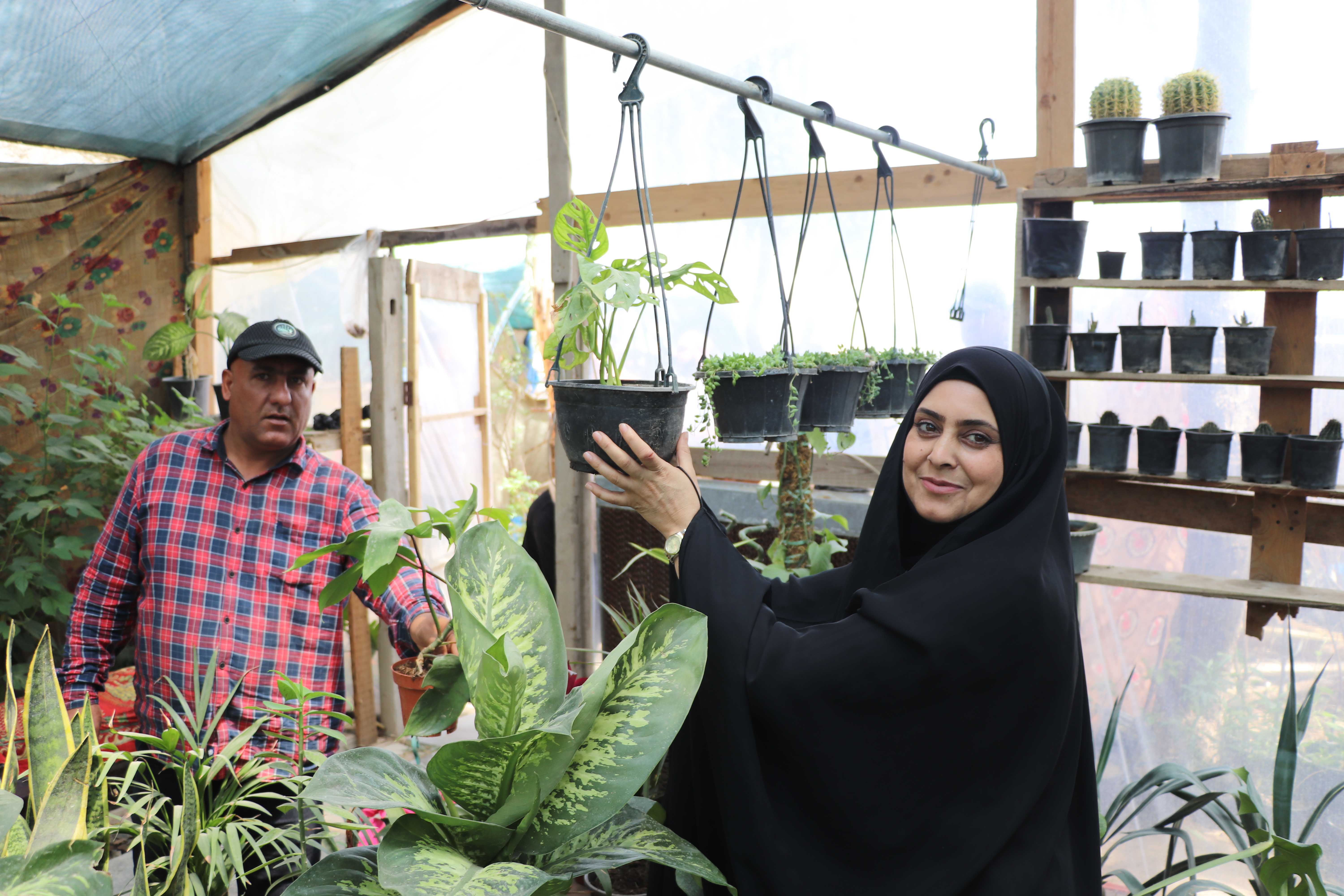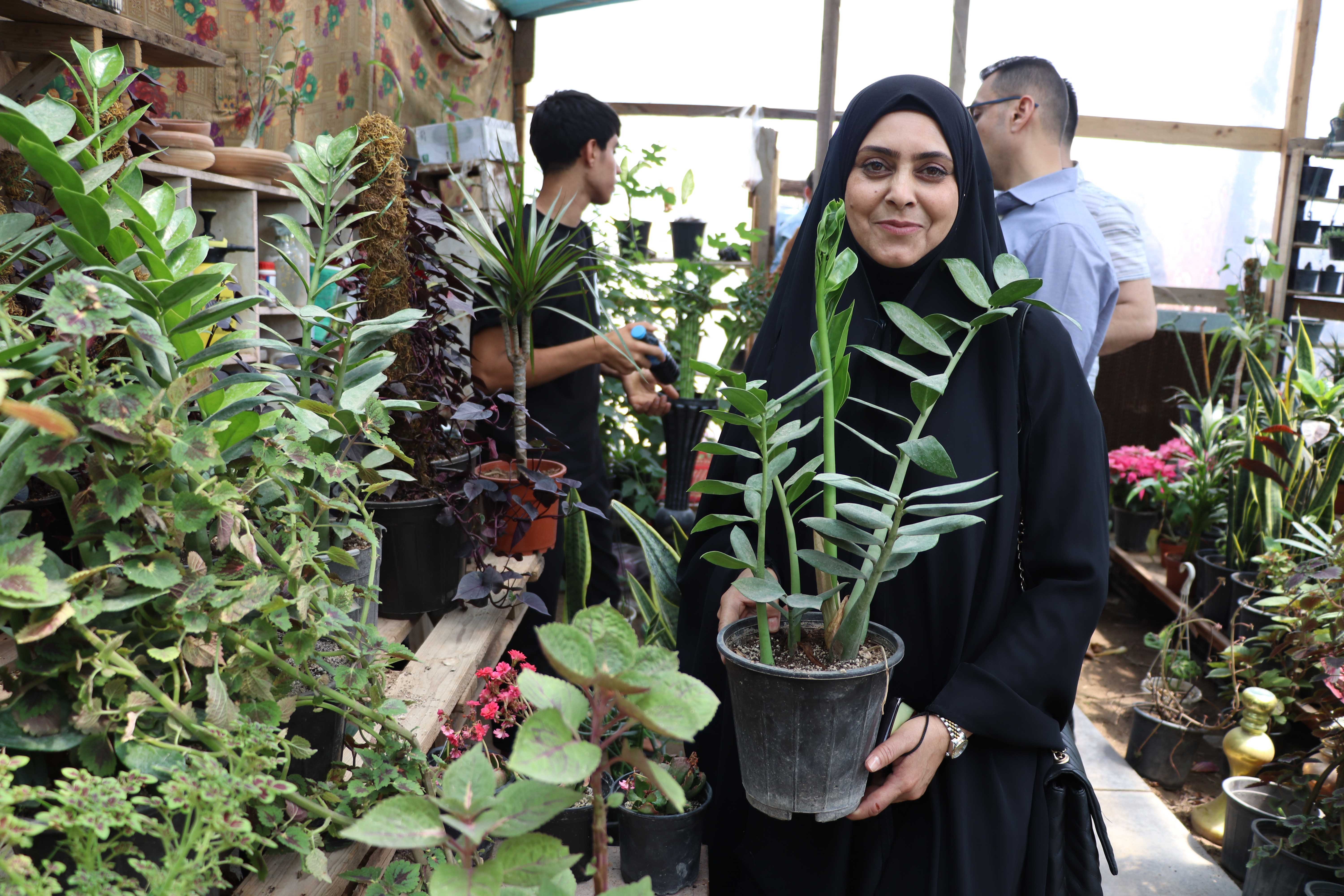How UNDP’s vocational training activities are empowering women and building social cohesion
A blooming hope for Wafaa
May 22, 2024

Ahmed Jabar Yasin (in the background), who provided Wafaa with hands-on experience at his nursery in Diyala town.
Baquba, Diyala Governorate - In 2017, tragedy struck Wafaa's life when her husband passed away, leaving her widowed and having to care for their five children, the youngest just a year old.
As a stay-at-home mother with no income, she found herself relying solely on the meagre support from the Government's Public Distribution System, which was barely enough to sustain her family.
At the end of 2023, life offered her a glimmer of hope when she was selected to take part in a vocational training course by the United Nations Development Programme (UNDP) and its partner, Human Appeal.
Wafaa joined a group of eleven other selected trainees to learn the art of growing flowers and ornamental plants.
“During the training, I learnt how to manage different types of plants, and the best times for planting them, whether in winter or summer. I also learnt how to get gardens ready for planting,” Wafaa shared.
Starting at the local government vocational institution, Wafaa and fellow trainees learned the theoretical aspects of planting and managing flowers, this was followed by a hands-on experience at a local nursery in Diyala town run by Ahmed Jabar Yasin.

Wafaa takes in the scent of one of her blooming lilies in the nursery.
After excelling in both classes, Ahmed offered to keep her on as supplier for the nursery, where she now earns some money whenever her plants are sold.
Wafaa now visits the nursery regularly to drop off her home grown freshly potted plants for sale. In addition, she uses these visits to learn more planting techniques. Currently, she is learning about fruit and vegetable growing, so she can diversify her garden and earn more.
“There are a lot of widowed mothers in our community, it is good to support them with a source of income,” Ahmed shared, adding that his nursery is enclosed making it comfortable for women to work there.
A month after completing the 40-day training programme, Wafaa is proud to share that she has earned about $100 (approximately 145,000 IQD) since she started supplying the nursery with flowers from her home garden.
“I was so happy to join this programme because jobs are scarce here in Diyala, especially for us without an education. It’s even harder for us widowed women, so it’s good to see us getting opportunities too. We are able to work and earn an income,” she said.

She requested more diversity in the women’s programmes to include hairdressing, handicrafts and sewing. Given that theirs is still a traditional society, she believes these would enable women to work comfortably from their homes.
This is the goal of UNDP’s Social Cohesion Programme: to empower individuals like Wafaa while supporting the community to rebuild social bonds together. By working together, they can achieve social cohesion establishing the groundwork for sustainable peace in Iraq.
About this initiative
Through its Community-Based Reconciliation and Reintegration in Iraq (C2RI) project – a part of its Social Cohesion Programme, UNDP is working with partners Human Appeal to promote return, reintegration, and social cohesion in Iraq’s areas of return. Implemented in Kirkuk, Diyala, and Anbar Governates, the C2RI project has already impacted 170 beneficiaries, including 82 women across all the Governorates.
With a target of reaching 9000 individuals in 2024, these efforts, supported by UNDP's Funding Windows for Peacebuilding, are instrumental in laying the foundation for a peaceful and socially cohesive Iraqi society as the country embarks on its sustainable development journey.

 Locations
Locations


